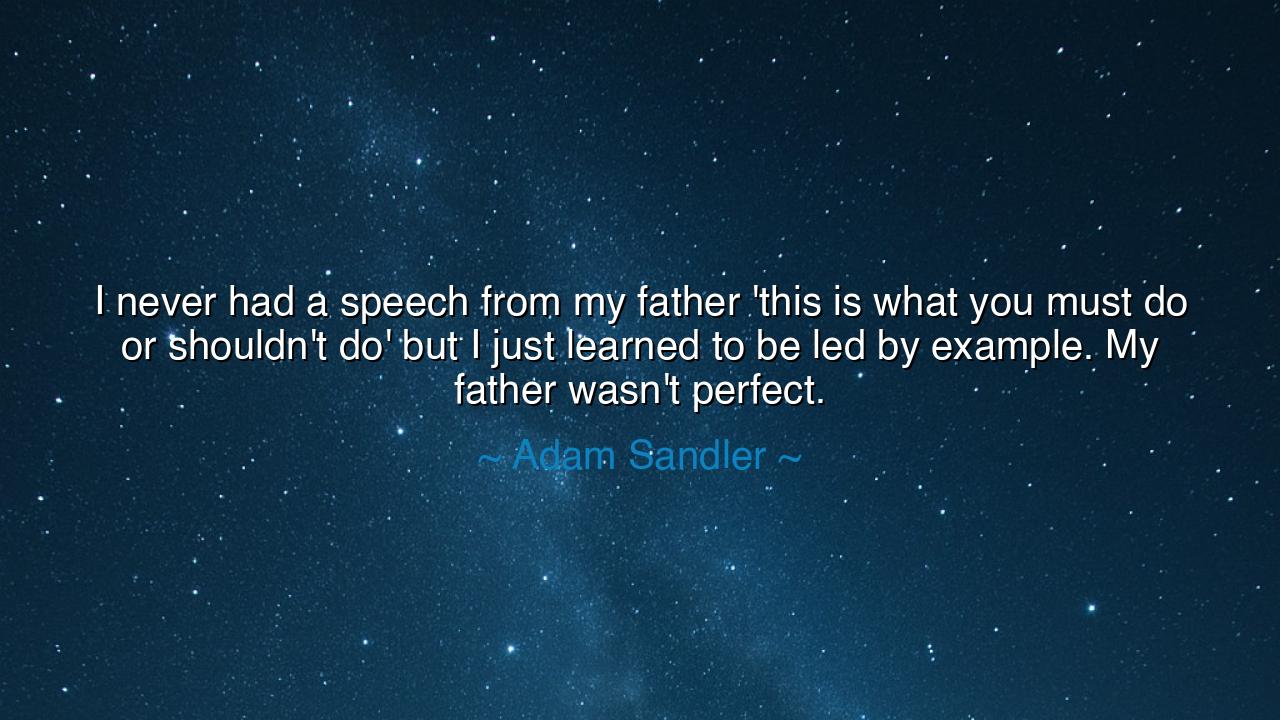
I never had a speech from my father 'this is what you must do or
I never had a speech from my father 'this is what you must do or shouldn't do' but I just learned to be led by example. My father wasn't perfect.






The words of Adam Sandler, “I never had a speech from my father ‘this is what you must do or shouldn’t do,’ but I just learned to be led by example. My father wasn’t perfect,” speak not only of a son’s memory, but of an ancient truth that transcends time and lineage: that wisdom is lived, not spoken, and that the truest teachings of a parent are not found in commands, but in conduct. These words hold the quiet strength of humility and love, the understanding that even imperfect men can light the way for their children through their actions. In this reflection, Sandler pays tribute to a universal truth—that the most enduring lessons in life are those taught not by the tongue, but by the soul’s daily example.
In the ancient world, fathers were seen as both guides and guardians, pillars of the home whose actions shaped the moral world of their children. Yet the greatest among them did not rely on decrees or scolding, but on presence. The wise father knows that a son’s heart remembers what it sees more deeply than what it hears. Sandler’s father, by his own son’s admission, did not seek perfection, nor did he preach ideals; he simply lived his truth. And in living it, he taught something more valuable than rules—he taught authenticity, resilience, and humanity. Through his imperfections, he reminded his son that goodness does not require flawlessness, but sincerity.
There is an echo of this truth in the story of Marcus Aurelius, the philosopher-king of Rome. In his Meditations, he writes not of lectures from his teachers or orders from his predecessors, but of the examples they set. Of his adoptive father, Emperor Antoninus Pius, he wrote: “From him I learned patience, serenity, and to see in every act the pursuit of justice.” Antoninus did not instruct Marcus through command; he revealed his wisdom in his daily temperance, his humility, and his calm in the face of turmoil. So too did Sandler’s father shape his son—not with speeches, but with his way of moving through life. The truest education of the heart comes not from words but from watching how a person lives when no one else is watching.
The admission that “my father wasn’t perfect” carries within it the deepest humility—a recognition that human imperfection is not a barrier to love, but part of what makes it sacred. Too often, we seek our heroes without blemish, forgetting that the greatest strength often hides within frailty. The imperfect father teaches by living through his flaws, by showing how to fall and rise again, how to bear the weight of responsibility even when burdened by doubt. In this way, his imperfection becomes his greatest lesson. For the child learns that to live well does not mean to live flawlessly, but to live honestly—to strive, to fail, to forgive, and to begin again.
Consider the tale of Abraham Lincoln, who often spoke of his own father with both affection and complexity. Thomas Lincoln was a rough man, uneducated and stern, yet his son absorbed from him the unspoken virtues of hard work, humility, and endurance. Though their relationship was not perfect, it forged in Abraham a resilience and compassion that would later guide him through the darkest hours of his nation. Like Sandler, Lincoln learned not from his father’s perfection, but from his example—from a life that embodied persistence more than eloquence, duty more than grandeur.
Adam Sandler’s words also remind us of the power of silence in shaping character. The absence of lectures, the quiet of understanding, leaves space for the child’s own conscience to grow. The father who leads by example allows his child to observe and interpret, rather than obey blindly. This cultivates wisdom rather than compliance, character rather than conformity. To be “led by example” is to be given freedom—to see virtue in motion and choose it for oneself. It is the difference between being told what is right and feeling what is right through another’s presence.
Thus, the lesson of these words is clear: lead by example, for actions plant deeper roots than speeches. Parents, mentors, and leaders—know that your children and followers will become reflections of what you do, not what you say. Let your daily life be your sermon. Do not hide your imperfections, but face them with courage, for through your humanity others will find permission to grow. And to the sons and daughters who seek perfection in their parents—look instead for sincerity, for there is wisdom even in the flawed hand that steadies you.
In the end, Adam Sandler’s reflection is not only about his father; it is about the eternal inheritance passed from one generation to the next: that love, example, and authenticity outlive all words. A perfect father is not the one without faults, but the one whose imperfections still guide his child toward goodness. Let your life, then, be your legacy—not through grand speeches or rigid rules, but through the quiet consistency of your heart. For as long as your actions align with truth, your example will echo long after your voice has fallen silent.






AAdministratorAdministrator
Welcome, honored guests. Please leave a comment, we will respond soon